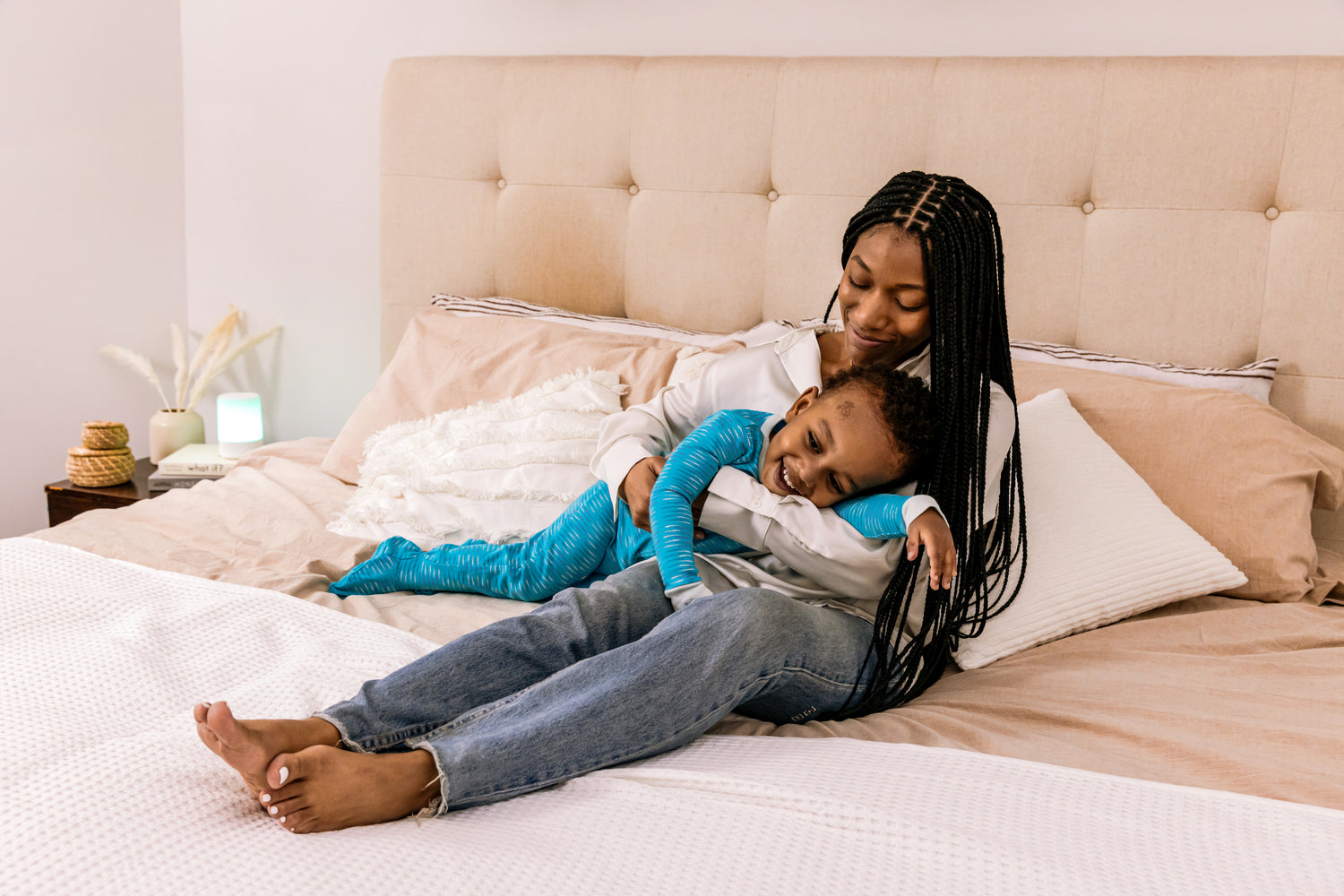Reviewed by Nanit Lab's Dr. Natalie Barnett.
The term “mindfulness” gets thrown around quite a lot as a way to improve just about every aspect of our lives. You may even have your own associations with this concept—perhaps you envision someone who meditates for hours on end, and acts completely zen 24/7.
But mindfulness doesn’t require you to own a yoga mat and practice a specific lifestyle. Simply put, mindfulness is a technique for helping you process your thoughts and feelings. And when applied to parenting, mindfulness has the potential to benefit both you and your child. Here is our guide on what mindful parenting means, and how you can practice it in your own parenting routine.
What is mindful parenting?
The practice of mindfulness, beyond its immediate effect on the individual, also impacts social relationships, including those between parents and children. Research has shown that a parent's thoughts can shape their actions, which can then significantly influence their child's sleep habits and overall behavior. This is due to the fact that children are incredibly attuned to and influenced by their parents' emotional condition. Consequently, when a parent practices mindful self-regulation, driven by their intentional thoughts, they can create a more serene and supportive environment for their children, thereby enhancing their overall wellbeing.
Mindful parenting applies these principles to support parents as they deal with the daily demands of raising kids. It can be a helpful reminder to pause before reacting to a toddler meltdown or a string of “nos.” And since kids learn how to cope with stress by watching their parents, mindfulness can show your children how to respond when they’re feeling overwhelmed.
Mindfulness can help you beyond emotional regulation. Taking a deep breath can improve your physical health, too. As more oxygen flows through your system, the practice literally calms your nerves.
Of course, the key thing to remember is that mindfulness is a practice. You don’t have to get it right on the first try. Some days it’s easier to pause before reacting. Other days there are just too many other things going on to slow down for a second. Mindful parenting is all about being gentle with yourself. Think of mindfulness as simply another tool in your parenting toolbox. If you find it helpful, you can incorporate it into your own unique parenting style. Just like with any other parenting tips, it’s OK to take what works for you and your family, and leave the rest.
What are the key principles of mindful parenting?
Mindful parenting focuses on three core principles.
1. Awareness
When we react to stressful situations, our innate fight, flight, or freeze response takes over. Even though you’re not in danger, your primal brain can’t always tell the difference between being chased by a bear and being late for daycare. This can make it easy for our emotions to take hold.
Mindful parenting attempts to interrupt that ingrained stress reaction. By encouraging you to focus your full attention on the present moment, it can create a bit of distance from your emotions. Ideally, this gives you some time to think before reacting. The awareness tools in a mindfulness practice can also teach you how to actively listen to your environment and the people in it.
For instance, let’s say you’re having one of those mornings. Your baby has been fussy since they woke up, and trying to get them ready for the day feels like an uphill battle. And just when you think you can make it out the door on time, your baby has a sudden diaper blowout.
This situation would cause any parent to get frustrated. A mindfulness practice doesn’t mean you don’t feel upset over the unexpected. But it can teach you to pause and observe your frustration before it gets the better of you. If you stop and take a deep breath maybe you can even laugh it off. (Although in this case, maybe save the deep breaths for after you change their diaper.)
2. Understanding
The more you observe your emotions, the hope is that you can also gain a better understanding of what makes you react in certain ways. Learning to be compassionate with yourself when you’re angry or upset is no easy task. But over time, it can feel more natural to accept your thoughts and emotions in a judgment-free way. And the more you can practice non-judgmental self awareness, the easier it is to model empathy for your kids.
For example, temper tantrums are one of the most universally challenging aspects of parenting. As your child learns to communicate their own emotions, it can be rough for both of you. When all your child knows to do is scream or cry, it can be tempting to react the same way.
But if you approach the situation mindfully, it can be easier to see things from your child’s point of view. If you take a second before reacting, it might be easier to respond with kindness instead of frustration. This can help calm your child in the moment and teach them in the long run to validate their feelings.
3. Attitude
Mindful living can help shift your overall perspective to center non-judgment and acceptance, even in those moments where you do react before you think. This can make it much easier to forgive yourself and move on if you have a meltdown right along with your child.
Let’s say you’re experiencing an afternoon where everything is just too much, and you do end up yelling. You can still take a mindful moment after the fact and view your frustrated emotions objectively. This can make it easier to not let that one instance rule everything that happens afterward. With some space, you can learn to recenter yourself and maybe even explain to your child why you reacted the way you did. This shows your kids that these emotions are normal, as you demonstrate a healthy way to process your feelings and take accountability.
How does mindfulness regulate emotions in children and parents?
Just like with most things, kids learn how to cope with stress by watching their parent’s behavior. If you’re in the habit of taking a moment before reacting to a potential stressor, your kids may also pick up on this as the norm. Children who grow up in mindful households may develop positive social skills, including increased compassion and kindness. Studies have shown that those who practice mindfulness may even have higher self esteem.
A mindful practice can also mean that you may have more energy and capacity to parent overall. You can’t pour from an empty cup, and a mindfulness practice can help you refill that cup when it’s running low. And when you replenish your own resources on a regular basis, it can be much easier to show up for your kids.
How to mindfully parent
If mindful parenting sounds like something you want to try, here are the key things to remember when you encounter a challenging situation.
- Pause. First things first. If a difficult situation arises, stop and take some time to think before reacting.
- Listen. Take it all in. Notice if any particular external stimuli are causing a physical or emotional reaction.
- Recognize emotional triggers. Learning to recognize what causes reactions for you or your child can take away some of their power, as you learn healthy ways to process.
- Empathize. When you’re ready to respond, try to prioritize kindness and compassion.
How to practice mindful parenting daily
Living as a mindful family takes daily practice, and there are many ways you can incorporate it into your routine. If it helps, start small. We’ve talked a lot about employing mindfulness in busy moments, but it can also help to practice observing your feelings in lower stakes situations.
If the house is quiet during naptime, and you walk into a room where your child didn’t pick up their toys like you asked, pause. This can be the perfect time to take a deep breath and reflect on what feelings arise. Don’t push away anger or frustration—sit with it. You’ll probably have more time to think your response through, so you can calmly discuss with your child when they wake up.
And on the flip side, you don’t have to wait for negative emotions to practice mindfulness. A happy moment of family bonding is a great chance to practice being fully in the moment. Breathe and observe how you feel physically and emotionally when the family is together. Slowing down for any kind of emotion, good or bad, can train our body to pause instead of immediately reacting. And it may even make it easier to slip into mindful habits when your day isn’t going according to plan later.
The link between mindfulness, sleep and parenting
Mindful parenting involves understanding the significant role of sleep, not only for the parent but also for the baby. Parental thoughts and attitudes about their baby's sleep can have a profound impact on the actual sleep patterns of both parties involved. It's beneficial to approach this aspect with mindfulness and openness, observing and accepting any feelings that arise around sleep times. If you're feeling anxious about your baby's sleep, or frustrated at your own lack of rest, acknowledge these feelings. Try to maintain a calm and patient mindset, as your emotions can subtly influence your baby's environment, possibly affecting their sleep.
Research has repeatedly highlighted the importance of sleep, revealing that lack of quality sleep can lead to numerous health issues, including increased risks of postpartum depression (PPD) and postpartum anxiety (PPA). Consequently, mindful consideration of sleep is crucial. Adopting mindfulness practices can help you cultivate a peaceful mindset before bedtime, making it easier for you to fall asleep and improving the sleep quality of your baby as well.
Recognizing the value of sleep is a step towards promoting a healthier life for both you and your child. Each restful night strengthens your ability to be fully present and engaged during your awake times, making it easier to practice mindful parenting. Therefore, in your daily mindfulness routine, consider adding practices that create a restful mindset, such as gentle bedtime yoga, guided sleep meditations, or deep-breathing exercises. Over time, these practices can help transform sleep into another opportunity for mindfulness and restoration, rather than a source of stress or anxiety.
Balancing self-care as a mindful parent
Achieving self-care as a parent can sometimes feel like an uphill battle. But taking care of yourself can also mean your internal battery is fully charged, so you can parent in top form. And since time to yourself as a parent can be limited, a mindful practice can help you fit in a minute or two to reset. This strategy is also doctor recommended. Dr. Alice Pickering, licensed clinical psychologist and perinatal mental health professional, told Nanit that new parents may want to approach self-care one small step at a time.
“Take things day by day, moment by moment,” Dr. Pickering says. “Do the little and simple things that fill your cup and remind you that you’re human. Adjusting and re-framing expectations can help in this regard. We often fall captive to various thinking errors that lead us to experience guilt, shame, sadness, anxiety, anger, or frustration when we feel as though we aren’t doing “enough.” Recognize when this might be happening and take note.”
Mindful parenting and positive parenting: similarities and differences
Mindful parenting may be confused with positive parenting. There are certainly overlaps in both techniques.
Positive parenting is a parenting style that focuses on rewarding good behavior instead of punishing negative behaviors. Like mindful parenting, its core principles encourage parents to respond to their children in an insightful, reflective way. This approach also asks parents to set a good example so their children learn positive behaviors. And like mindful parenting, a positive parenting style may contribute to overall stress reduction for the whole family.
The key difference is that positive parenting focuses on behavior, whereas mindful parenting emphasizes recognizing your own internal responses to situations. Mindful parenting highlights the need to stop and slow down when your external environment is moving too fast. You can certainly use these two parenting philosophies in tandem if they both resonate with you. It’s possible to take a mindful moment and then use positive parenting principles to respond. It’s all about figuring out which parenting styles fit into your own unique parenting rules.
How Nanit helps support mindful parenting
The practice of mindfulness extends into every aspect of parenting, including the crucial domain of sleep. Studies have shown a correlation between a parent's thoughts about their baby's sleep and the sleep patterns of both parent and child. For instance, if parents worry excessively about their child's sleep or lack confidence in their baby's ability to sleep well, it may negatively affect both the baby's sleep and the parents'. Mindful parenting thus includes acknowledging these feelings and learning to navigate them effectively.
In this context, Nanit can be a powerful tool in reinforcing mindful parenting, particularly regarding sleep. With its advanced sleep tracking capabilities, Nanit offers data-driven insights into your child's sleep patterns. These insights can help to reassure parents, alleviate anxieties, and foster confidence in your baby's sleep abilities. For example, Nanit's sleep score lets you understand how well your baby has slept based on different factors like duration, wake-ups, and sleep onset. This can empower you with the knowledge needed to address potential sleep issues and cultivate better sleep habits.
Nanit's Community is an excellent resource to discuss sleep-related concerns and share experiences. The collective wisdom from other parents and the professional guidance from experts can provide reassurance and practical tips. Whether it's about navigating sleep regressions or establishing a bedtime routine, the community's collective wisdom and expert advice can boost your confidence and help you make more informed decisions.
As part of your mindful parenting journey, Nanit helps turn sleep into a less stressful and more manageable aspect of raising a child. The intersection of sleep, mindfulness, and community support via Nanit can be a game-changer for new parents navigating this exciting, yet challenging, life chapter.
Mindful parenting can be a helpful tool
Parenthood can feel like a whirlwind. Mindfulness can help you pause and view things in slow motion. And as you get used to stopping and noticing your feelings before reacting, your child may start to mimic your healthy habits. All of this is easier said than done some days, but again, you get to make the rules here. Mindful parenting is just one of many techniques that can help you find your footing as you develop your own unique parenting approach.
Editorial Team
Dr. Natalie Barnett:
 Natalie Barnett serves as VP of Clinical Research at Nanit. Natalie initiated sleep research collaborations at Nanit and in her current role, Natalie oversees collaborations with researchers at hospitals and universities around the world who use the Nanit camera to better understand pediatric sleep and leads the internal sleep and development research programs at Nanit. Natalie holds a Ph.D. in Genetics from the University of New England in Australia and a Postgraduate Certificate in Pediatric Sleep Science from the University of Western Australia. Natalie was an Assistant Professor in the Neurogenetics Unit at NYU School of Medicine prior to joining Nanit. Natalie is also the voice of Nanit's science-backed, personalized sleep tips delivered to users throughout their baby's first few years.
Natalie Barnett serves as VP of Clinical Research at Nanit. Natalie initiated sleep research collaborations at Nanit and in her current role, Natalie oversees collaborations with researchers at hospitals and universities around the world who use the Nanit camera to better understand pediatric sleep and leads the internal sleep and development research programs at Nanit. Natalie holds a Ph.D. in Genetics from the University of New England in Australia and a Postgraduate Certificate in Pediatric Sleep Science from the University of Western Australia. Natalie was an Assistant Professor in the Neurogenetics Unit at NYU School of Medicine prior to joining Nanit. Natalie is also the voice of Nanit's science-backed, personalized sleep tips delivered to users throughout their baby's first few years.








































